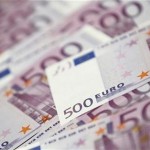Friday’s trade saw EUR/USD within the range of 1.2373-1.2571. The pair closed at 1.2390, losing 1.19% on a daily basis and 1.07% for the whole week.
Fundamentals
Euro zone
German IFO Business Climate
Business climate in Germany probably remained almost unchanged in November, with the respective gauge rising to 103.4 from 103.2 in September. The latter has been the lowest index reading since December 2012, when it was reported at 102.4.
The IFO Business Climate Index reflects entrepreneurs’ sentiment in regard to current business situation and their expectations for the next six months. The index is based on a survey, conducted by phone and encompasses 7 000 companies, that operate in sectors such as manufacturing, construction, wholesaling and retailing industry. The Business Climate Balance represents the difference between the percentage share of respondents that are optimistic and the share of respondents that are pessimistic. The balance can fluctuate between -100, which suggests all responding companies assess their situation as poor and expect business conditions to deteriorate, and +100, which suggests all responding companies assess their situation as good and expect an improvement in business conditions. In order to calculate the IFO Business Climate Index, the Balance is normalized to the average of a base year, which currently is 2005.
The IFO Business Climate Index is comprised by two equally-weighted sub-indexes – a gauge of expectations and a gauge of current assessment. The IFO expectations index probably rose to 98.5 in November from 98.3 in October, as the latter has been the lowest since December 2012. The IFO current assessment index probably slipped to 108.2 in the current month from 108.4 in October. If so, this would be the lowest index level since April 2013. In case any of the gauges registered a larger-than-projected increase, this might have a bullish effect on the common currency.
The CESifo Group is to release the official numbers at 9:00 GMT on Monday.
ECB Draghi remarks
On Friday European Central Bank President Mario Draghi said that the bank was ready to act in order to deal with low inflation in the Euro area.
“A stronger recovery is unlikely in the coming months,” Mario Draghi said in an opening speech at the Frankfurt European Banking Congress, referring to the most recent preliminary Euro zone Purchasing Managers Index (PMI), as reported by CNBC. The gauge of new orders in the region dropped for the first time since July 2013 in November, as reported by Markit Economics on Thursday. The composite index came in at 51.4, missing expectations and below the final value of 52.1 in October.
“The inflation situation in the euro area has also become increasingly challenging,” ECB Draghi noted on Friday. “We see that it has been essential that the ECB has acted —and is continuing to act—to bring inflation back towards 2 percent.” He reiterated that the central bank was committed to expand its asset purchase program.
“We are committed to recalibrate the size, pace and composition of our purchases as necessary to deliver our mandate,” Draghi said, cited by the same media.
“This is why the Governing Council has tasked ECB staff and the relevant Eurosystem committees with ensuring the timely preparation of further measures to be implemented, if needed.”
Following these remarks, EUR/USD plunged sharply to 1.2425 on Friday and later in the day registered a new low at 1.2373, which has also been the pairs lowest level since November 7th.
United States
Activity in the US sector of services was probably little changed in November, with the corresponding preliminary Purchasing Managers Index coming in at a reading of 56.9. If so, this would be the lowest index reading since April, when the final value was reported at 55.0. In September the final seasonally adjusted PMI stood at 57.1, down from a preliminary value of 57.3. The PMI is based on data collected from a representative panel of more than 400 private sector companies, which encompasses industries such as transport and communication, financial intermediaries, business and personal services, computing & IT and hotels and restaurants. Values above the key level of 50.0 indicate optimism (expanding activity). Lower-than-expected PMI readings would mount selling pressure on the US dollar. The preliminary data by Markit Economics is due out at 14:45 GMT on Monday.
Pivot Points
According to Binary Tribune’s daily analysis, the central pivot point for the pair is at 1.2445. In case EUR/USD manages to breach the first resistance level at 1.2516, it will probably continue up to test 1.2643. In case the second key resistance is broken, the pair will probably attempt to advance to 1.2714.
If EUR/USD manages to breach the first key support at 1.2318, it will probably continue to slide and test 1.2247. With this second key support broken, the movement to the downside will probably continue to 1.2120.
The mid-Pivot levels for Monday are as follows: M1 – 1.2184, M2 – 1.2283, M3 – 1.2382, M4 – 1.2481, M5 – 1.2580, M6 – 1.2679.
In weekly terms, the central pivot point is at 1.2455. The three key resistance levels are as follows: R1 – 1.2537, R2 – 1.2684, R3 – 1.2766. The three key support levels are: S1 – 1.2308, S2 – 1.2226, S3 – 1.2079.





